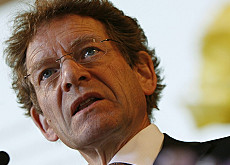
Funding outlook worries institute chief

Zurich's Swiss Federal Institute of Technology faces a future cash shortfall and loss of autonomy under current government plans, its interim president has warned.
Konrad Osterwalder said on Tuesday the world-renowned institute is in good health despite the upset caused by the resignation of former head Ernst Hafen last year, but faces some real challenges.
Last year the Swiss cabinet agreed to increase spending on research and education by six per cent between 2008 and 2011.
But Osterwalder does not think that Switzerland’s federal institutes, which include schools in Zurich and Lausanne as well as other centres, will see the full benefit of this cash boost.
“We think that the six per cent currently under discussion is the minimum we need to maintain the present level of quality,” he told swissinfo.
“The distribution of new funds will not be even amongst all institutions. The [federal institutes’] domain will not get the full six per cent – it will probably get 4.7 per cent – and we still don’t know what Zurich will get. All of these things are of great concern to us.”
Osterwalder also fears that government proposals to shake up the tertiary education system in Switzerland will centralise power in the capital Bern, putting universities at a disadvantage.
International recognition
“It is obvious that full autonomy without any limits is not possible because the people who pay for [tertiary education] have to have a say,” he said.
“As to what extent the federal government or central administration should determine what happens at individual universities is an open question. I am not absolutely happy with the way things are [progressing].”
Osterwalder was speaking at the Zurich institute’s annual conference at which the school declared its intention to attract more students from abroad.
It also hopes to raise its international profile by combining with a number of globally famous universities, such as Cambridge, Harvard, Yale, Tokyo and Singapore, to create an environmentally friendly campus benchmark model.
Osterwalder, a professor of mathematics, will leave the institute after 12 years as part of the management to take up a new position as head of the United Nations University in Tokyo this September.
Messy resignation
Before he departs, the institute must find a full time president following the messy resignation of Ernst Hafen, who quit last November after meeting resistance to his planned reforms.
Osterwalder, who has been standing in since then, insists that the institute’s reputation has not suffered too much as a result.
“People have a low esteem of the institute only if they don’t know the functioning of a university. People who have a bit more insight admire the school and the way it handled a very difficult situation,” he told swissinfo.
“In industry this is a very normal situation and nobody says much about it. We are proud to have handled it efficiently and well.”
swissinfo, Matthew Allen in Zurich
Zurich Federal Institute of Technology facts (academic year 2006/2007):
13,412 students (707 more than previous year).
This includes 2,794 PhD students, a rise of 13%.
The institute offers 23 Bachelors and 26 Masters degree courses.
In 2006, the university boasted 16 spin-off companies (nine in 2005), and a further 13 in the first quarter of 2007.
Budget: SFr1.15 billion ($950 million).
21 Nobel Laureates have ties to the Zurich Federal Institute of Technology.

In compliance with the JTI standards
More: SWI swissinfo.ch certified by the Journalism Trust Initiative


























You can find an overview of ongoing debates with our journalists here . Please join us!
If you want to start a conversation about a topic raised in this article or want to report factual errors, email us at english@swissinfo.ch.